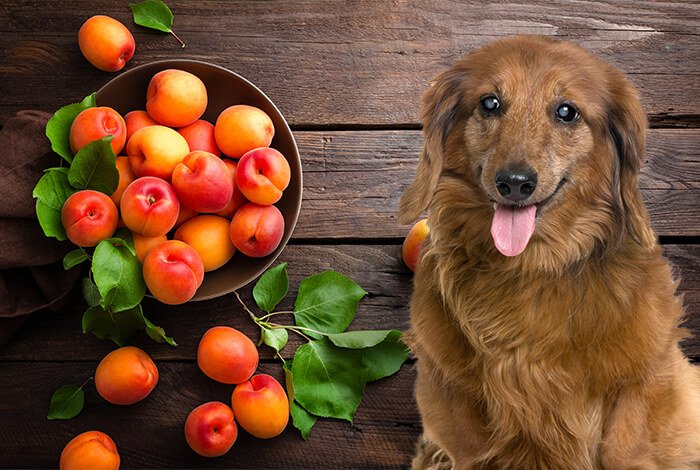
Can Dogs Eat Apricots? Yes, dogs can eat the flesh of apricots, and they can be a tasty treat when given in moderation. This fruit provides some nutrients that can be beneficial for your furry friend.
However, you must be careful to remove the pit, leaves, and stem, as these parts can be toxic. Always consider apricots an occasional snack rather than a regular part of your dog’s diet to keep them healthy and happy! So, let’s briefly discuss that-can dogs eat Apricots?
Nutritional Benefits of Apricots for Dogs
When it comes to healthy snacks for your dog, you might be wondering, can dogs eat apricots? The answer is yes, but they should be served safely and in moderation. Apricots are not only delicious but also pack a nutritional punch that can benefit your furry friend in several ways. Let’s explore the nutritional benefits of apricots for dogs.
1. Rich in Vitamins A and C
- Eye Health: Apricots are an excellent source of vitamin A, which is essential for maintaining good vision and overall eye health in dogs. This vitamin helps support the retina and can prevent issues related to eyesight.
- Immune Function: The vitamin C in apricots plays a crucial role in bolstering your dog’s immune system. It helps fight off infections and supports healthy skin and coat.
2. Dietary Fiber for Digestive Health
- Aids Digestion: Apricots are high in dietary fiber, which is beneficial for your dog’s digestive system. Fiber helps regulate bowel movements and can prevent constipation, ensuring that your pup stays comfortable and healthy.
- Promotes Gut Health: A diet rich in fiber supports a healthy gut microbiome, contributing to overall digestive health and reducing the risk of gastrointestinal issues.
3. Antioxidants to Combat Oxidative Stress
- Cellular Protection: Apricots contain antioxidants, which help neutralize free radicals in your dog’s body. This is important for reducing oxidative stress, which can lead to various health issues over time.
- Anti-Inflammatory Properties: The antioxidants found in apricots may also have anti-inflammatory effects, helping to reduce inflammation and support overall well-being.
Can dogs eat apricots? Absolutely! These fruits are not only tasty but also packed with beneficial nutrients. From supporting eye health and immune function with vitamins A and C to aiding digestion with dietary fiber and providing antioxidants for cellular health, apricots can be a valuable addition to your dog’s diet. Just remember to serve them fresh and in moderation, removing the pit to keep your pup safe. Treat your dog to this delicious fruit, and enjoy watching them thrive!
Understanding the Risks Associated with Apricot Consumption
While apricots can be a nutritious treat for your dog, it’s crucial to understand the risks associated with apricot consumption. Specifically, the dangers related to apricot pits can pose serious health threats to our furry friends. Let’s dive into the potential risks of feeding apricots to dogs.
1. Toxicity of Apricot Pits
- Cyanogenic Compounds: Apricot pits contain cyanogenic compounds, which can release cyanide when ingested. This toxin can interfere with oxygen transport in the body, leading to severe health consequences.
- Potential Poisoning: If a dog ingests an apricot pit, they risk cyanide poisoning, which can be life-threatening. Symptoms of poisoning may include difficulty breathing, dilated pupils, and a rapid heart rate.
2. Choking Hazards
- Risk of Choking: The size and hardness of apricot pits make them a choking hazard for dogs. If a dog attempts to swallow a pit, it may become lodged in the throat, leading to choking and potential asphyxiation.
- Immediate Danger: Choking can lead to distress and may require emergency intervention to remove the obstruction and restore normal breathing.
3. Intestinal Blockages
- Digestive Issues: If an apricot pit is swallowed, it can cause an intestinal blockage. This blockage can prevent food and waste from moving through the digestive tract, leading to discomfort, pain, and serious health complications.
- Signs of Blockage: Symptoms of an intestinal blockage can include vomiting, lethargy, loss of appetite, and abdominal pain. If you notice these signs, seek veterinary attention immediately.
While can dogs eat apricots is a question with a positive answer regarding the fruit’s flesh, the associated risks with apricot pits cannot be overlooked. Always ensure that the pits are completely removed before offering apricots to your dog. By understanding these risks and taking precautions, you can safely enjoy apricots as a treat for your furry companion.
Identifying Symptoms of Apricot Poisoning
When considering whether can dogs eat apricots, it’s essential to recognize the potential dangers associated with the fruit, particularly the pits. If your dog accidentally consumes an apricot pit, understanding the symptoms of apricot poisoning can be critical for timely intervention.
Difficulty Breathing
- One of the most alarming signs of apricot poisoning is difficulty breathing. If your dog appears to be gasping for air or has labored breathing, this is an urgent sign that requires immediate veterinary attention.
Dilated Pupils
- Dilated pupils can indicate distress in dogs. If you notice that your dog’s pupils are larger than usual, it could signal a reaction to toxins like those found in apricot pits.
Rapid Heart Rate
- A significantly increased heart rate can also be a concerning symptom. If you can feel your dog’s heartbeat racing or notice changes in their heart rhythm, seek veterinary care as soon as possible.
Gastrointestinal Distress
- Vomiting: If your dog vomits after consuming apricot pits, this is a warning sign. While some vomiting can occur due to various reasons, in the context of apricot consumption, it may indicate poisoning.
- Excessive Drooling: Increased salivation can occur as the body attempts to rid itself of toxins. If your dog is drooling more than usual, it’s worth noting.
- Lethargy: Unusual tiredness or lack of energy can be a response to illness. If your dog is less active than normal and seems to lack interest in their usual activities, this could be a sign of a serious issue.
When to Seek Help
- If you observe any of these symptoms after your dog has eaten an apricot pit, it’s crucial to act quickly. Immediate veterinary attention is necessary if you suspect poisoning. The sooner your dog receives medical care, the better their chances of recovery.
While can dogs eat apricots in moderation is generally a safe question concerning the fruit’s flesh, the potential risks of apricot pits are significant. Knowing how to identify symptoms of apricot poisoning can save your dog’s life. Always remove the pits and keep a close eye on your pet after they consume any part of the apricot. If in doubt, consult your veterinarian for guidance.
How to Properly Serve Apricots to Your Dog
When it comes to sharing tasty treats with your furry friend, you might wonder, can dogs eat apricots? The answer is yes, but it’s crucial to serve them correctly to ensure your dog’s safety and health. Here’s how to properly prepare apricots for your dog:
1. Remove the Pit, Leaves, and Stem
- Safety First: Apricot pits contain cyanogenic compounds that can release cyanide when ingested, posing a serious health risk to your dog. Always remove the pit before offering apricots. Additionally, the leaves and stems should also be discarded, as they can cause digestive upset.
2. Cut into Small, Manageable Pieces
- Choking Hazard: To minimize choking risks, cut the apricot into small, bite-sized pieces. This helps ensure that your dog can safely chew and swallow the fruit without any issues. Small pieces also make it easier for your dog to digest.
3. Serve Fresh Apricots Only
- Avoid Processed Options: Stick to fresh apricots and avoid dried or canned varieties. Dried apricots often contain added sugars and preservatives that are not healthy for dogs. Canned apricots may have syrup or other additives that could be harmful.
By following these simple steps, you can safely enjoy sharing apricots with your dog. Remember, while can dogs eat apricots is a question with a positive answer, serving them correctly is essential for your pet’s well-being. Always prioritize fresh fruit and remove any potentially harmful parts before treating your dog to this delicious fruit. If you have any concerns or questions about your dog’s diet, consult your veterinarian for personalized advice.
Exploring Other Safe Fruits for Your Dog
While can dogs eat apricots is an important question, it’s equally valuable to know about other safe fruits you can share with your furry friend. Fruits can be a delightful and nutritious addition to your dog’s diet. Here are some great alternatives:
1. Apples (with Seeds Removed)
- Nutritional Benefits: Apples are a fantastic source of vitamins A and C, as well as dietary fiber. They can help support your dog’s immune system and promote healthy digestion.
- Serving Tips: Always remove the seeds and core before offering apple slices to your dog. The seeds contain cyanogenic compounds that can be harmful in large quantities.
2. Blueberries
- Antioxidant Powerhouse: Blueberries are low in calories and high in antioxidants, which can help combat oxidative stress in your dog’s body.
- Easy to Serve: You can serve them fresh or frozen, making them a perfect treat for warm days. Just toss a few into your dog’s bowl or mix them in with their regular food.
3. Bananas
- Potassium-Rich Treat: Bananas are a great source of potassium, vitamins, and fiber. They can be a healthy, low-calorie snack for your dog.
- Moderation is Key: Due to their high sugar content, it’s best to offer bananas in moderation. A few small pieces as an occasional treat will do!
4. Watermelon (without Seeds)
- Hydrating Snack: Watermelon is not only delicious but also hydrating. It contains a lot of water, making it a great choice for hot days.
- Preparation: Make sure to remove the seeds and rind before serving. Cut the flesh into small, bite-sized pieces to avoid choking hazards.
5. Strawberries
- Vitamins and Antioxidants: Strawberries are packed with vitamin C, fiber, and antioxidants, making them a nutritious choice for your dog.
- Natural Sweetness: Dogs often enjoy the sweet taste of strawberries, so they can be a delightful treat. Just be sure to wash them thoroughly and remove the stems.
Conclusion
In addition to asking can dogs eat apricots, exploring other safe fruit options can enhance your dog’s diet. Apples, blueberries, bananas, watermelon, and strawberries are all nutritious choices that can provide various health benefits. Remember to introduce new fruits gradually and keep an eye out for any signs of allergies or sensitivities. If you have any doubts or questions, don’t hesitate to consult your veterinarian for tailored advice. Your dog deserves the best!



